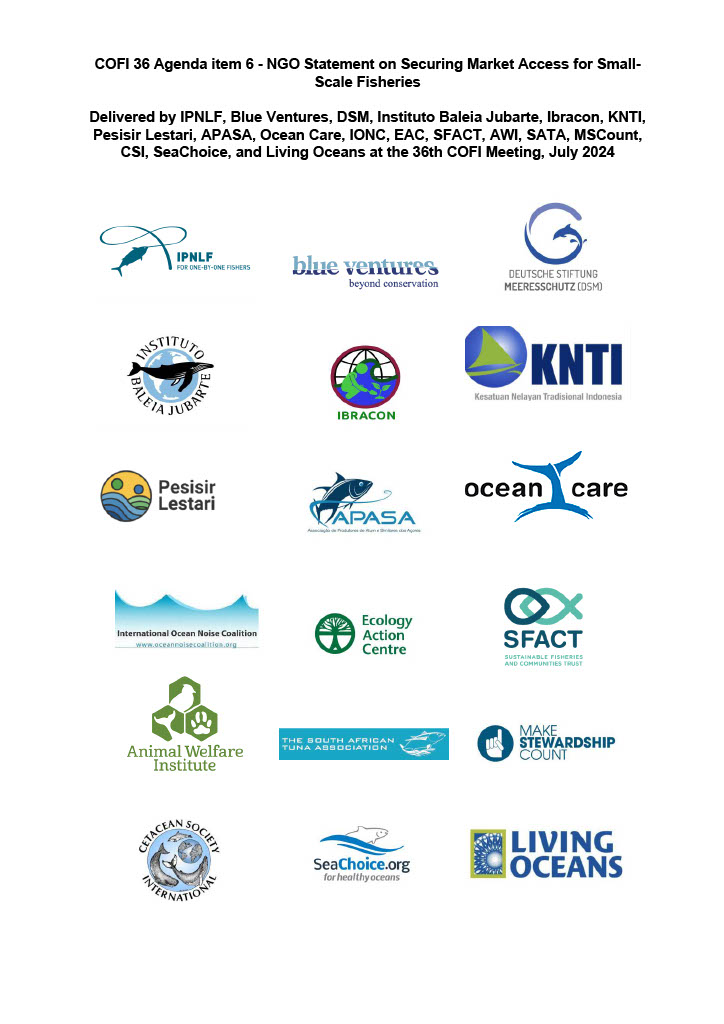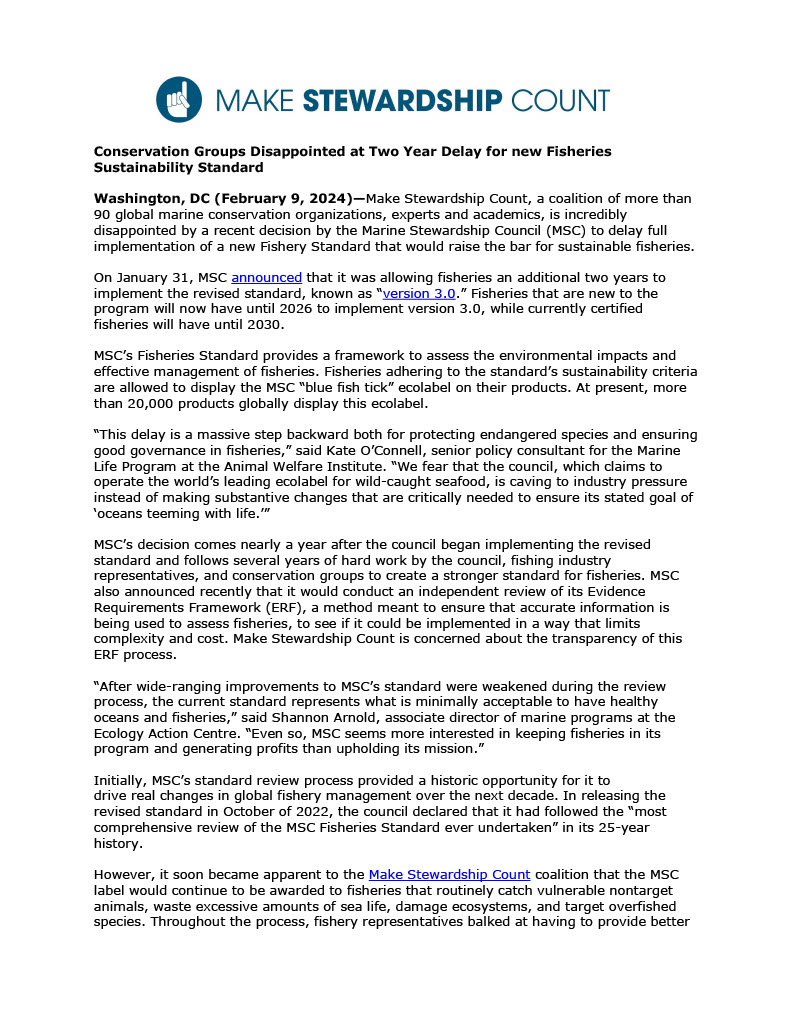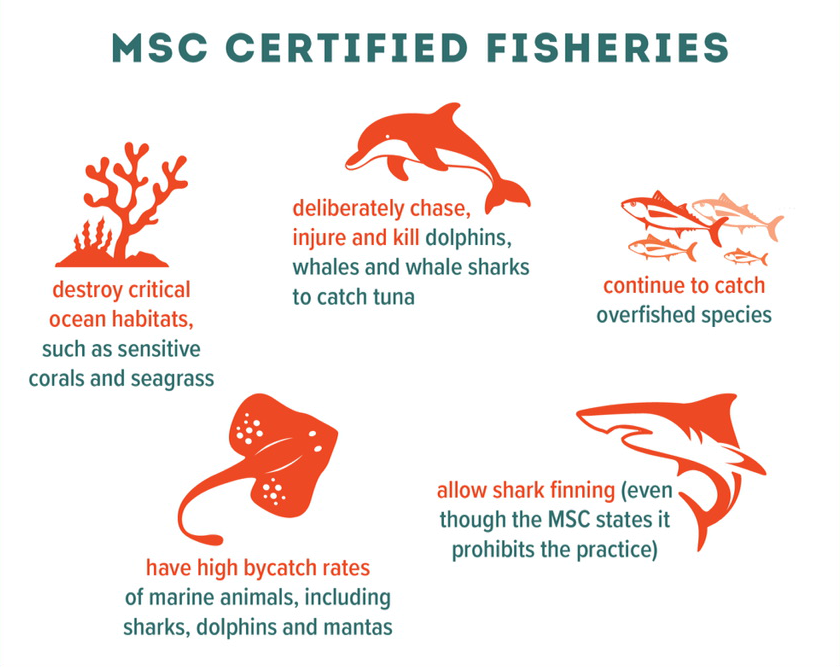Who we are
We are a coalition of more than 90 marine conservation experts, organizations, and researchers from around the world working to hold sustainable seafood certifications to account. We are striving to make sure consumers and retailers can trust the labels on their seafood, and that only truly sustainable fisheries are recognized – it’s time to put an end to seafood label greenwashing.
The Marine Stewardship Council (MSC) label, which millions of consumers rely on for trusted seafood, is increasingly being awarded to fisheries that routinely catch thousands of vulnerable animals, waste excessive amounts of sea life, irreversibly damage our ecosystems, and catch overfished species.
Right now the MSC Certification Standard is being revised. We are calling for urgent changes to raise the bar, ensure scientific rigour, and ensure that seafood with the MSC label actually represents the ‘gold standard of sustainability’ as advertised.
What are we asking for
In preparation for the every-5-year MSC Standard Review, we have been working with experts from around the world to distil the critical changes needed to the MSC Certification Standard ‘Principle 2 – Minimising Environmental Impacts’ as well as their procedure to ensure credibility, transparency, and impartiality.
After more than a decade of engagement as stakeholders in hundreds of MSC fishery assessments and multiple Standard Reviews, this is our final push to move the MSC back to what it was created to be – a credible ecolabel that guides consumers in making sustainable choices for their seafood purchases, thereby driving improvement in fishery management, protection of threatened species and habitats and promoting what the MSC has itself described as an “ocean teeming with life”. In the 2020–2022 Standard Review we are calling for the MSC to:
1 Ensure that the full ecological impacts of a certified fishery are assessed and progressively improved and fisheries are not wasteful of marine lives and resources.
2Ensure that the entirety of the certified fishery methods, gear, and catch are sustainable and that all ‘main species’ of a catch are managed equally to the target species.
3Ensure that MSC certified fisheries do not destroy seafloor biodiversity, and that the MSC Standard is consistent with internationally accepted fisheries management standards.
4Ensure that the sustainability claim of MSC certified fisheries is evidence based and transparent for all of the data used for decision-making in the assessments and audits of fisheries.
5Ensure that condition-based certification is resolved prior to recertification.
6Ensure that the certification assessment and audit process are impartial.
7Proactively uphold the scientific rigour and goals of the program.
Read full technical details in our OPEN LETTER to MSC and our CRITICAL CHANGES document.
Wesentliche Forderungen zur Verbesserung des MSC
Die geforderten Verbesserungen resultieren aus Untersuchungen und deren Analyse durch Umweltschutzorganisationen und Wissenschaftler aus dem Bereich des Meeresschutzes und der Nachhaltigkeitszertifizierung von Fisch und Meeresfrüchten. Die Forderungen beziehen sich sowohl auf eine Verbesserung des „Principle 2“ (Beifang und Ökosystem) als auch auf die Verbesserung des Zertifizierungsprozedere in Hinblick auf Glaubwürdigkeit und Unparteilichkeit. Sie resultieren aus unserer Beteiligung als Interessenvertreter in einer Reihe von MSC Zertifizierungen, die zu Bedenken gegenüber dem MSC Zertifizierungsstandard und seiner Anwendung geführt haben.
Um die gesamte Liste mit den Details zu den geforderten Verbesserungen zu sehen laden Sie bitte den pdf in Englischer Sprache herunter
1Die gesamte Auswirkungen der zu zertifizierenden Fischerei auf das marine Ökosystem sind zu bewerten und diese Auswirkungen müssen schrittweise reduziert werden um den sinnlosen Tod von Meeresbewohnern als Beifang und die Verschwendung marine Ressourcen zu vermieden.
2Alle Fangaktivitäten (Methoden und Fangeräte) einer Fischerei müssen für den gesamten Fang nachhaltig sein und alle Arten die den Hauptanteil des Fanges ausmachen müssen ebenso nachhaltig bewirtschaftet werden wie die zu zertifizierende Zielspezies.
3MSC-zertifizierte Fischereien dürfen nicht zur Zerstörung der Artenvielfalt der Lebensräume am Meeresboden beitragen und der MSC Standard muss die international anerkannten Bestimmungen für Fischereimanagement implementieren.
4Die Zertifizierung von Fischereien als nachhaltig muss beweisgestützt und transparent erfolgen. Dies gilt für sämtliche Daten die zur Zertifizierungsentscheidung bei Bewertungen oder Audits von Fischereien herangezogen werden.
5Ist eine Fischerei unter Auflagen zertifiziert worden, so müssen diese spätestens vor der ersten Re-Zertifizierung vollständig erfüllt sein.
6Die Bewertung einer Fischerei sowie die durchgeführten Audits müssen vollständig unparteiisch erfolgen können.
7Das MSC muss den Stand der Wissenschaft pro-aktiv implementieren und die Nachhaltigkeitsansprüche seines Programms umsetzen.





